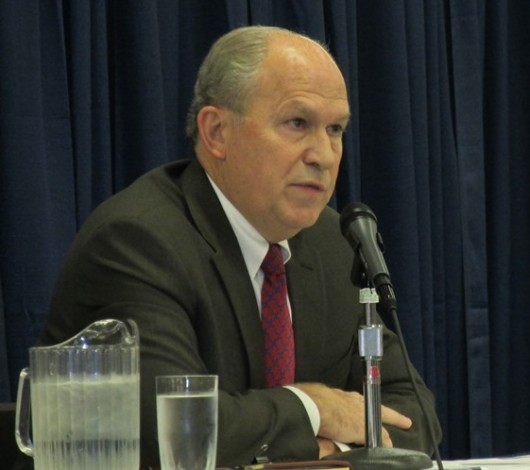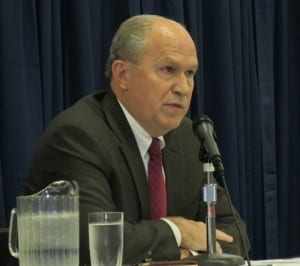Gov. Bill Walker was in Ketchikan this weekend for a series of inaugural events planned by a local committee. During his visit, he stopped by KRBD to talk with local media about issues that he and the Legislature are grappling with this legislative session, not the least of which is the budget.
The state budget is the overwhelming concern in the capitol right now. Oil prices have plummeted, which means the state’s main source of revenue – oil taxes – has all but dried up, leaving Alaska’s lawmakers an estimated $3.5 billion deficit.
Gov. Bill Walker submitted his own budget to the Legislature, with some healthy cuts across the board, and the Legislature has added more cuts. But Walker said some of those cuts need another look.
“The No.1 item was putting back in the money on the forestry that was taken out, the $1.3 million, that virtually, as it’s been explained to me, is very devastating to the state program,” he said. “We all know, the federal program has been disappointing. I don’t want us to do the same thing on the state level.”
The state timber office manages logging on Alaska land.
Another program Walker believes should continue to be funded is career and technical education. He said that’s how the state trains its own workforce.
“I’m a carpenter with a law degree, and I’m most proud of being a carpenter,” he said. “I believe strongly in career and technical educational opportunities, strongly in workforce development. We’ve had some strong success rates with those that are involved with workforce development, and those that are involved in career and technical education, so let’s not cut that.”
Walker added that the direction he gave to his commissioners was to keep the economic health of small communities in mind when trimming their department budgets.
“Don’t reach out to rural Alaska for low-hanging fruit on budget cutting,” he said. “Five jobs out of Dillingham are different than five jobs in more urban areas. So, let’s make sure we don’t just reach out and consolidate. I’ve been pretty sensitive to that.”
One example Walker gave was the House Finance Committee’s proposed 59 percent cut to state funding for public broadcasting. The governor had proposed an 18 percent cut in his budget, which he said was pretty deep already. Walker said a broad-based approach to budget cutting doesn’t work for Alaska.
“We’re just not a one-size fits all state. We need to be careful,” he said. “That’s why we try to take a scalpel to it, rather than an ax.”
Walker said the budget trimming process likely will continue beyond this year, because projections don’t show an increase in oil prices anytime soon. He said he looks forward to having a little more time after this session to dig into the state’s finances, and research how Alaska historically funded different programs.
While the budget is the biggest issue in front of state lawmakers, it isn’t the only one. Walker also talked a little about marijuana legalization, and said the process for establishing regulations is moving along and will meet all the deadlines.
He has introduced legislation to create a Marijuana Control Board that would oversee the industrial side of legalization.
Walker also talked about the Ketchikan Gateway Borough’s education funding lawsuit, and said that he’s been working on a Plan B in case the Alaska Supreme Court denies the state’s motion for a stay pending resolution of the appeal. Walker said there are three potential options.
“One is further reductions in the budget, reassess on the education funding – what we do on education funding — and I guess the third one would be to dig deeper into the savings, which I’m not sure anybody is interested in option three, but they’re there and it’s always an option,” he said.
A superior court judge in January ruled that the state’s longtime requirement that municipal governments pay a certain amount for public education violates Alaska’s Constitution. State attorneys quickly filed an appeal with the Supreme Court, and filed for a stay until the high court makes a final ruling on the case. The Supreme Court has not yet ruled on the motion for a stay.
Walker said a tax — for education or just to help balance the budget — isn’t something he wants to get into quite yet. He said lawmakers should first work on budget cuts, and then start gathering input about a possible statewide tax.
Medicaid expansion was one of the main points of Walker’s campaign. He said that is moving through the Legislature, and has a broad base of support across the state.
“We’ve had resolutions of support from city councils, assemblies, school boards, medical associations, hospital associations, faith-based organizations, chambers of commerce,” he said. “It almost looks non-partisan.”
Walker said that in addition to Medicaid expansion, which he said would help about 40,000 more Alaskans get health coverage, he also is looking at ways to reduce the program’s overall cost to the state.
KRBD will have more from the governor’s inaugural events later next week.







